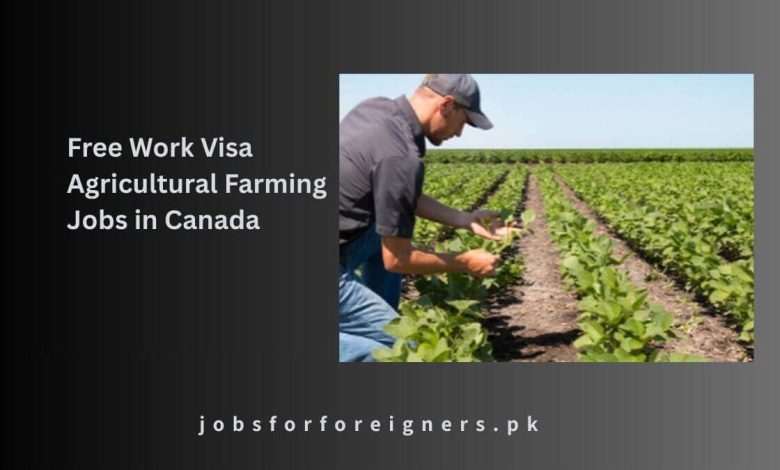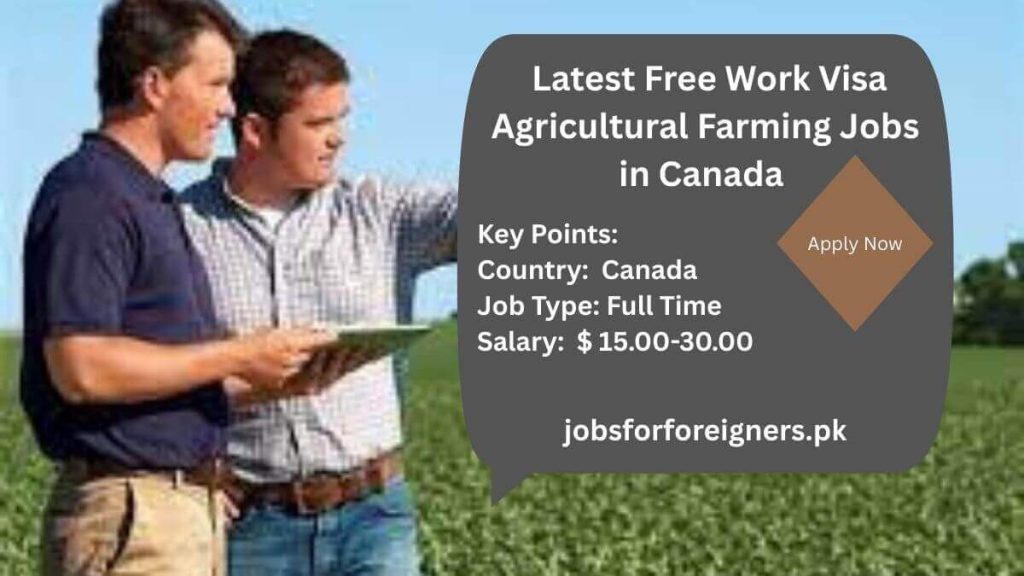Free Work Visa Agricultural Farming Jobs in Canada 2025

In 2025, Canada will continue to provide international laborers with a variety of agricultural farming positions, frequently with visa sponsorship and without the necessity of an IELTS score or Labour Market Impact Assessment (LMIA). These prospects are optimal for those who are in search of full-time or seasonal employment in the agricultural sector of Canada, which is currently flourishing.

Job Details:
- Country: Canada
- Job Title: Agricultural farming
- Education: Diploma
- Experience: Few Years
- Relocation: Yes
Popularity:
Canada has most farming jobs, but these don’t require a degree in most cases, except for the ones with specialists such as crop engineers. Veggie selecting in Canada is the optimal occupation for individuals who lack a college degree. As these positions are sponsored by free VISA sponsors, candidates from various countries are not required to obtain visa sponsorship. The utmost wage for these types of positions in Canada is CAD $30 per hour. it goes through the lowest at an hourly CAD 15/hr.
Benefits:
The ones who work on Canadian farms on their pay list often have advantages and do not list other things like bonuses and so on.
- Visa Sponsorship at No Cost:
Employers reimburse work visa fees, which are typically priced between CAD $155 and $225. This results in a cost savings for you. They frequently provide support during the application procedure, which encompasses legal documentation and paperwork. - Legal Employment in Canada:
Under programs such as the Temporary Foreign Worker Program (TFWP) or the Seasonal Agricultural Worker Program (SAWP), sponsored laborers are granted legal authorization to engage in employment. Offers legal protections and job security in accordance with Canadian labor laws. - Competitive Compensation:
CAD $15 to $25 per hour is the average wage. During prime harvest seasons, overtime is frequently compensated. - Subsidized or Free Accommodation:
Numerous employers provide complimentary accommodation on or near the farm. Significantly reduces your living expenses. - Healthcare Accessibility:
Upon your arrival, you may be eligible for provincial health insurance, contingent upon the type of visa and the province. Employers occasionally offer private health insurance during the interim period. - No prior experience or education is necessary:
Numerous agricultural positions, including fruit harvesting and general labor, necessitate no prior experience. Typically, on-the-job instruction is administered. - Route to Permanent Residence:
After acquiring experience in Canada, certain programs (such as the Agri-Food Pilot) permit applicants to submit applications for permanent residence.
Duties:
In the Canadian agricultural and farming sector, there are several jobs such as farm managers, people who pick vegetables or fruits, farm laborers, agricultural technical staff, agricultural engineers, farming logistics, and those who operate farm equipment. In farming, the most common job duties are:
- Harvesting fruits and vegetables
- Irrigating crops
- The engineering professional is responsible for the configuration of cultivation, the selection of vegetables, and other tasks.
- Scraping of vegetables
- Overseeing livestock
- Marketing and material supply contracts are executed by wholesalers.
- It is crucial to evaluate the quantity of the produce.
- The production of product packaging, its placement on displays, and its shipment to the end consumer.
- Unloading and loading
- Generate a daily report.
Check Also: Canada Work Permit without Agent – How to Get
Requirements:
Normally, you should already have a job offer from a Canadian employer before you can apply for a work visa.
- The employer may be required to demonstrate that they have explored the pool of Canadians or permanent residents and have not found any suitable candidates, as well as that there is a shortage of competent labor in the country.
- The job’s specifications and the employer’s qualifications are the determining factors. The two official languages of Canada, French and British, necessitate proficiency in both.
- The qualifications and experience that are necessary for each agricultural position are determined by its specific nature.
Types of Jobs:
We will talk about farming jobs by analyzing both the environment and salaries that job holders will be receiving in 2025.
- Vegetable/Fruit Picker: This position entails the selection of fruits and vegetables and the discarding of those that are unsuitable. Despite the fact that it is more physically demanding than other healthcare positions, nurses are required to receive an average of CAD 15/hour during the probationary period.
- General Farm Worker: These workers are responsible for a variety of duties, including the fertilization of crops, the maintenance of farm equipment, and the harvesting of crops. An average of approximately 15 Canadian dollars. Fifty dollars per hour.
- Farming Labor: These positions are associated with the cultivation of crops and the cultivation of land, as well as the propagation of domesticated animals. The demand for these positions is increasing due to the labor shortage in Canada.
- Farm Manager: The farm manager is accountable for the recruitment of new personnel, the development of budgets, and the enhancement of profits. Additionally, fodder managers may receive CAD 20 per hour or more.
- Agricultural Engineer: These individuals are accountable for the farming operations and their associated apparatus. The subsequent step is the compensation, which is an average of CAD 50 per hour, in light of the high demand and specialization that have resulted from this position.
Also Check:
Application Process:
Here is the application process:
Step 1:
Farming job search in Canada (the best recruitment companies, direct farms, and businesses). or
Step 2:
Resume and Cover Letter: Emphasize the qualities that are consistent with the job description and your strengths in your resume.
Adhere to Employer Guidelines: Make a reasonable effort to complete this task by adhering to the regulations outlined in the job description.
Step 3: Visa Application:
Secure a Job Offer and LMIA: The majority of farm positions are subject to a Labor Market Impact Assessment (LMIA), which your employer is required to obtain.
Apply for a Work Permit: The Temporary Foreign Worker Program (TFWP) is the method by which you can submit a work permit application once you have a job offer and LMIA letter in your possession.
Frequently Asked Questions:
What Are the Job Requirements?
Requirements can vary by employer and position but generally include:
No formal education required (experience in farming is a plus)
Physically fit for manual labor and long working hours.
Basic English or French communication skills (preferred).
Must meet Canada’s work visa requirements.What Are the Main Visa Programs for Agricultural Workers?
Canada offers several visa programs for agricultural workers:
Temporary Foreign Worker Program (TFWP): Allows employers to hire foreign workers for positions not filled by Canadians. Employers must obtain a Labour Market Impact Assessment (LMIA) to hire through this program.
Seasonal Agricultural Worker Program (SAWP): Specifically for workers from Mexico and participating Caribbean countries, allowing them to work in Canada for up to 8 months per year.
Agri-Food Pilot Program: Targets experienced, non-seasonal workers in specific industries and occupations, providing a pathway to permanent residency. Note that as of February 13, 2025, the program has received enough applications to fill all available spaces.Are There Agricultural Jobs in Canada Offering Free Work Visa Sponsorship in 2025?
Yes, many Canadian employers offer agricultural jobs with free work visa sponsorship for foreign workers in 2025. These positions often include roles such as fruit pickers, dairy farm workers, greenhouse staff, and general farm laborers. Employers typically cover visa application fees and may provide additional benefits like accommodation and meals.



